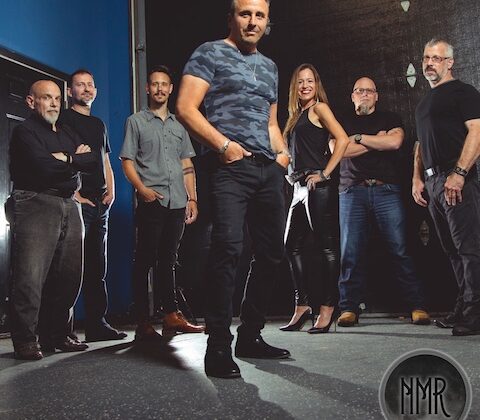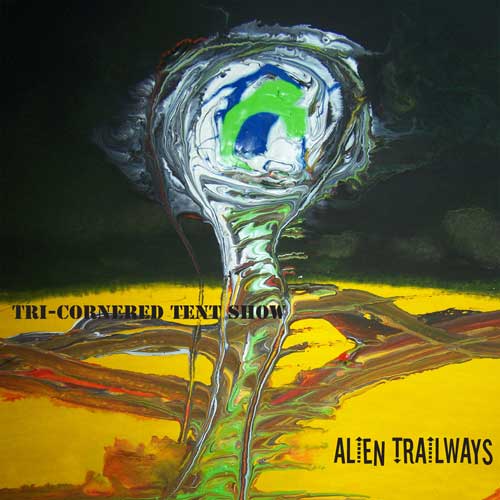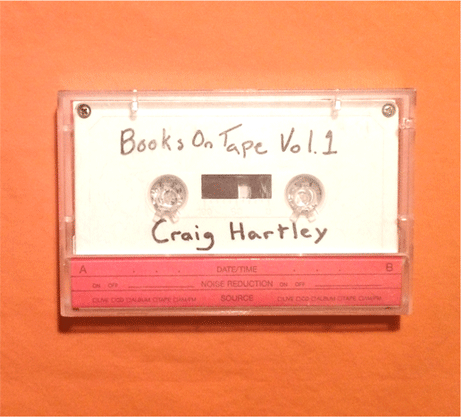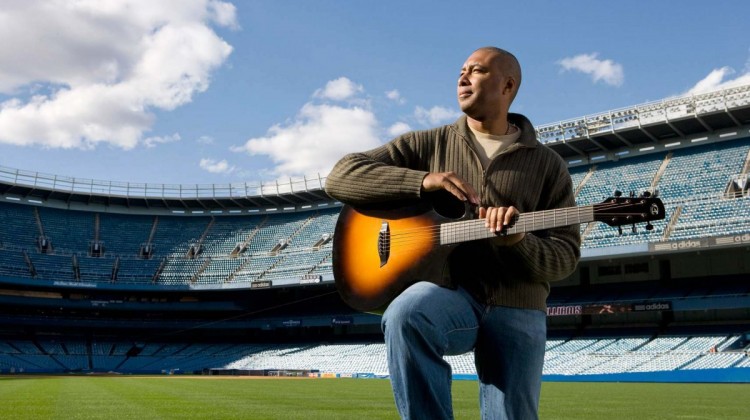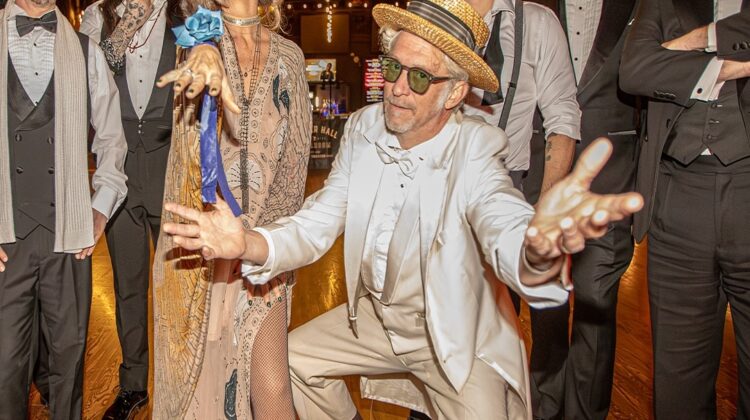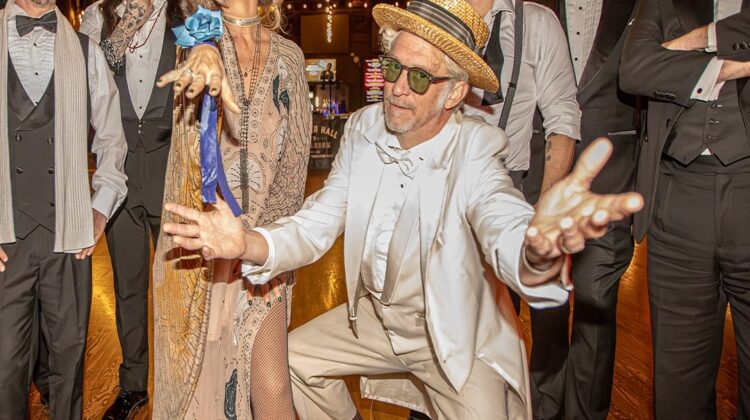Pianist’s Whaling City Sound Debut in February Features Karrin Allyson on Vocals,
With Phil Woods, Ignacio Berroa, Conrad Herwig and Harvie S,
Resulting in a Strong Ensemble Performance
When pianist and composer Dave Bass was still in his teens, he had his sights firmly set on a career as a professional musician. The Cincinnati native began piano lessons at age seven and, when just out of high school, performed in bands that opened for Alice Cooper and for Captain Beefheart. He was accepted to the Berklee College of Music, dropping out after a few months to pursue a less formal and more adventurous musical path which meant studying with George Russell at the New England Conservatory and with legendary piano teacher Madame Margaret Chaloff. Eventually he landed a gig touring internationally with singer Brenda Lee and, once settled in San Francisco, performed with the young Bobby McFerrin and with Jackie Ryan. It seemed he was firmly on the path to a successful life doing what he most loved, until fate intervened in the form of a pool of oil and a resulting fractured wrist – NOT good news for a professional musician. Bass was told that there was no guarantee that, once his wrist had healed, he’d be able to play again. With a family to support, he chose to complete his bachelor’s degree, after which he went on to earn his law degree at UCLA, and eventually made his way to Sacramento and a position as a Deputy Attorney General for the State of California. For Bass, music had not simply taken a back seat – it was stashed in the trunk!
Fast forward two decades to 2010, when – after five years of getting back his chops by playing casually with friends around Sacramento – Bass returned to the studio to record his first record as a leader, Gone, which featured the talents of Ernie Watts, Babatunde Lea, Gary Brown and Mary Stallings. Gone quickly rose up the jazz radio charts to the #2 position and made an equally strong critical impact. Jazzweekly.com lauded it as “simply stupendous,” and allaboutjazz.com noted, “Bass’ return to jazz, on this evidence, was long overdue and is definitely to be welcomed…” concluding, “Listening to what Dave Bass has done on Gone exemplifies the capabilities of an artist who can combine a big-picture mindset and diverse talents.” Encouraged by the success of Gone, Bass returned to the studio in 2012 for a musical outing with a more east coast flavor. The result is NYC SESSIONS, which features a cast of east coast giants: Phil Woods, Ignacio Berroa, Conrad Herwig, and Harvie S, with guest vocalist Karrin Allyson. The pianist brought the album, which will be released on Feb. 3, to New Bedford-based Whaling City Sound, where he’ll join a roster that includes Greg Abate, Gerry Gibbs’ Thrasher Dream Trio (with Kenny Baron and Ron Carter,) and Dave Liebman.
The pianist assembled his outstanding cast of players, which also includes Chris Washburne on trombone, Enrique Fernandez on flute, Carlos Caro on conga and percussion and Paulette McWilliams on vocals, at MSR Studios in New York City. “The more I got back into the music, the more I realized that the cats I wanted to play with were in New York,” notes Bass. “I liked the idea of musicians that could play all of the music I wanted to play, whether Latin or jazz.”
The album’s eleven tracks range in style from swinging straight ahead to Afro-Cuban flavored to soul tinged groove. Bass composed 9 songs, and arranged the three non-originals that he chose to feature – “La Comparsa” by the Cuban composer/pianist Ernesto Lecuona, the traditional Russian song “Dark Eyes,” and “My Foolish Heart” by Victor Young and Ned Washington. “I didn’t plan to record ‘My Foolish Heart,’ says Bass. “I asked Harvie and Ignacio if they’d like to try a standard. Since all the music that we’d recorded earlier that day had been highly arranged, I thought this might be a chance to do something familiar without any arrangement whatsoever. Just play. Also, it was a chance to have the classic ‘piano trio playing a standard’ format – a format I always enjoyed. ‘My Foolish Heart’ evidences the relaxed but introspective mood that resulted from the hard work and concentrated efforts we had put in earlier that day. The musical empathy that Harvie, Ignacio and I had developed just spilled out spontaneously.” Bass’ love for the melody of “Dark Eyes” can be traced back to his Russian Jewish background and also to the childhood experience of watching plate spinners on the Ed Sullivan Show while a high-velocity “Dark Eyes” played in the background.
La Comparsa, a written-out piece by the great Cuban composer/pianist Ernesto Lecuona, holds a special place for Bass. “As a kid I loved playing “Malaguena” and “Andalucia,” which were kind of ‘show-off’ pieces. I loved what I thought of as the ‘Spanish’ melodies and rhythms, and the dramatic dynamics each piece displayed.” During the 70s, Bass was caught up in the vibrant San Francisco Salsa scene where he heard some of the same “Spanish” melodies and rhythms. Although he didn’t make a connection with “Malaguena” or “Andalucia” at the time, whatever musical DNA led Bass to love playing “Malaguena” as a kid stayed with him for the long haul. When he saw the film “Calle 54” with Chucho Valdez playing “La Comparsa” in a duet with his father, Bebo, he realized that the composer of “La Comparsa” was none other than the composer of “Malaguena” and “Andalucia.” Bass grabbed the sheet music to La Comparsa, and, he says, “I worked out my own arrangement and harmonies and heard the Cuban Danzon as the rhythmic counterpoint to Lecuona’s slippery left-hand figure. I then decided to create a medley with a long dramatic arc, using a section of my own composition, ‘Mi Montuno.’ The percussion section ending this medley was a perfectly spontaneous contribution by Ignacio and Carlos.”
Bass’ proclivity for an expansive repertoire is evident on NYC SESSIONS, not only in the breadth of stylistic adventures he undertakes, but in the varied perspectives he can bring to a single song as both a composer and as a pianist. Take, for example, his two original compositions which were first introduced on Gone. Compare the dramatic, Afro-tinged instrumental version of “Lost Valentine” as “sung” by Ernie Watts’ tenor with Karrin Allyson’s tender bossa nova version on NYC SESSIONS, or the up-tempo version of “Since I Found You” on Gone with the medium-tempo vocal version on the new album. “For a long time I’ve been attracted to the great American Songbook, from straight forward vocal renditions like Sinatra’s to more exotic renditions like Ran Blake’s and Jeanne Lee’s. These songs also work exceedingly well as instrumentals, although many great instrumentalists, such as Dexter Gordon, seem to always keep the lyrics in mind when they play,” explains Bass. “This has inspired me to compose songs with lyrics that work in all the ways that the classics do: in different tempos, different styles, with a vocalist or as an instrumental. “ As a songwriter, Bass’ unique ability to craft lyrics for his own jazz compositions – from the poetic (“Lost Valentine”) to the Cole Porter-clever (“Since I Found You”), to the Ray Charles-ish, gospel-tinged (“Just a Fool”) – is especially impressive.
Since Bass spent much of his early musical career as an accompanist, it’s not surprising that he incorporates vocal tracks into his projects. What is interesting is his approach to selecting which singer would tackle which song. “Before we went into the studio, I offered more or less the same group of songs to both Karrin and Paulette, and asked each which they were most attracted to,” says Bass. “A singer has to identify with a song in a uniquely personal way. That said, I knew that even where both Karrin and Paulette expressed interest in the same song, they would each bring wonderful things to it.”
The mournful atmosphere that Allyson creates at the start of “Endless Waltz” permeates even her scatting, setting a tone that’s echoed by Bass’ subtle piano. McWilliams’ blithe vocals on “Since I Found You” add to the timeless tone of the track, which again emphasizes Bass’ affinity for the Great American Songbook. In his swinging solo, Phil Woods is caught up with the Great American Songbook spirit and quotes a song originally sung by Bob Hope. The vocalists that he’s tapped are enthusiastic about working with Bass. “I’m really impressed with the compositions,” says Allyson. “ ‘Lost Valentine’ evokes a film noir atmosphere. ‘Endless Waltz’ is a heartbreaker, but a lilting heartbreaker.”
As strong as the connection between the pianist/composer and Allyson and McWilliams is the bond that formed in the studio with the seven musicians who contribute their talents to NYC Sessions. From the album’s opener, “The Sixties,” with its truly inspired and hard-swinging solos by Bass, Phil Woods, Conrad Herwig, and Ignacio Berroa, it’s obvious that the sum of these remarkable players is much more than their individual parts. “Given that I compose in a fairly wide stylistic spectrum, it was important to me to find a rhythm section that could tackle straight ahead ballads, Afro-Cuban, and even gospel/R&B. And I wanted the musical integrity that would come from having the same rhythm section on every track,” explains Bass. “Harvie and Ignacio provide that in spades. They both made significant contributions to my music and both were an absolute joy to work with. Check out Harvie’s inspired solo on Dark Eyes! And having Phil Woods participate was astounding. His mere presence upped my game and once he started to play . . .!”
Bass will celebrate the release of NYC SESSIONS with several east coast shows. On February 12, he will be joined by Karrin Allyson, as well as Harvie S, trombonist Chris Washburn and drummer Richie Morales at Kitano in NYC. On Valentine’s Day, he’ll share the love by sitting in on Allyson’s gig at Scullers in Boston, where they’ll perform at least one of her tunes from the album. And on February 20, the Dave Bass Quintet, featuring Greg Abate on alto sax and flute, will perform at the Narrows Center for the Performing Arts in Fall River, Massachusetts, where they’ll share a very eclectic double bill with singer/songwriter Vance Gilbert.
For Bass, the trajectory from musician to lawyer and back again isn’t as different as it may seem. “I practice law and I practice piano. ‘Practice’ means that not only am I always learning more, but that the more I learn, the more I realize I have much more to learn. Also, both law and music seek to communicate and both seek to have those communications be persuasive. Just as music has the rules of harmony and rhythm, law is governed by rules. These similarities are
subtle. The many differences are obvious. The methods of communication are quite different and the content of the communication could not be further apart. Also, the law seeks to persuade to reach prosaic goals (pay this money, stop this activity), whereas music seeks to persuade in poetic ways (feel this way). Music invites and even requires creativity; the law less so. The rules of harmony and rhythm turn out to be more yielding than the rules of law. Finally, although both law and music are often the result of intense collaboration with others, the intensity of the give and take in music is unique in aspiring to the sublime.” That give and take and that ability to communicate are indeed among the attributes that bring this vibrant musical outing to life. As Phil Woods notes, “If you can’t dance to this, sit down!”
from Whaling City Sound T: 401.942.8025 mixedmediapromo@cox.net

